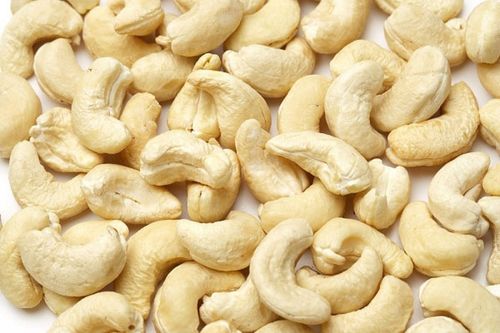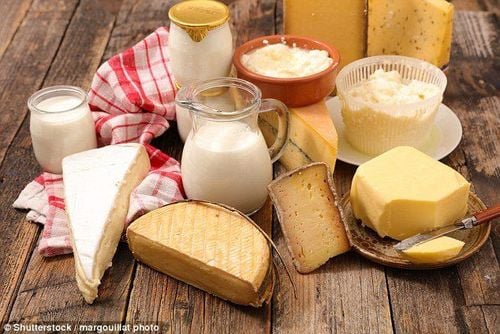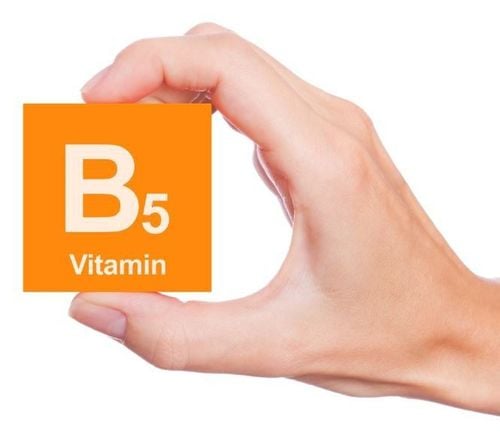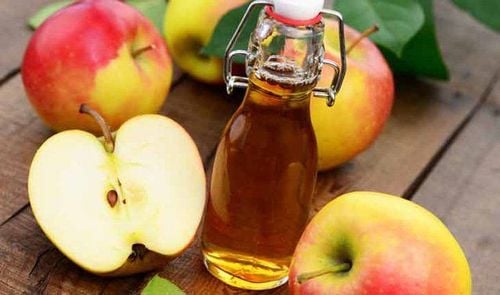This is an automatically translated article.
Cashews are buttery, sweet and savory, and provide an excellent source of vitamins and minerals. Cashews are native to subtropical climates.1. Nutritional composition of cashews
Cashews are native to South America, especially Brazil, Africa and India. Cashews are sold both raw or roasted, and salted or salted. Cashews have recently been used to produce milk substitutes such as cashew milk, cashew cheese and cashew cream sauces and sour cream. Nutrition facts in 28.34 grams (1 ounce) whole cashews:Calories: 157 calories Carbohydrates: 9.2 g Protein: 5.1 g Fat: 12.4 g Fiber: 1 g Vitamin E: 0.3 mg Vitamin K: 9.5 mcg Vitamin B-6 :0.1 mg Calcium : 10.4 mg Sodium : 3.4 mg Potassium :187 mg Magnesium: 83 mg Folate: 7 ug Although cashews are one of those nuts with low carbohydrate, fiber content, they contain many vitamins, minerals and antioxidants. These include vitamins E, K, and B6, along with minerals like copper, phosphorus, zinc, magnesium, iron, and selenium. All of which are important for many of the bodily functions we need.
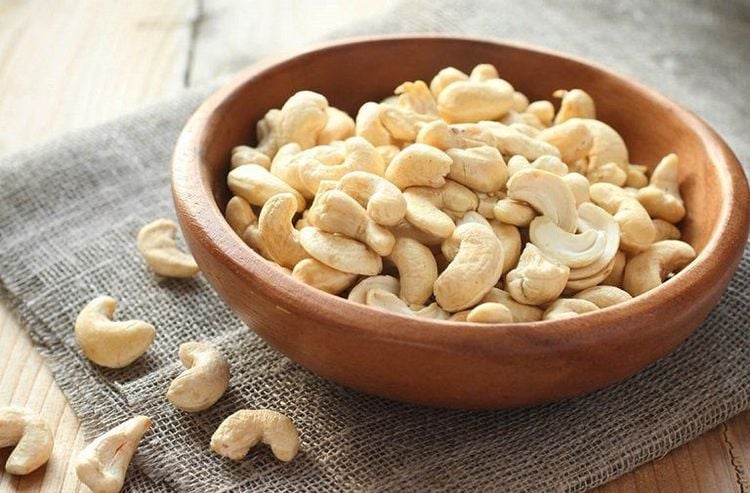
Hạt điều có vị bơ, vị ngọt và mặn, nó cung cấp một nguồn vitamin và khoáng chất tuyệt vời
2. Healthy benefits from cashews
Consuming plant-based foods has been shown to reduce the risk of many lifestyle-related health conditions. Here are the health benefits that cashews give us:2.1 Promotes heart health The monounsaturated and polyunsaturated fatty acids found in cashews can help lower LDL cholesterol and triglyceride levels . This reduces the risk of cardiovascular disease, stroke, and heart attack.
A study published in the British Journal of Nutrition found that the risk of coronary heart disease may be 37% lower in people who consume nuts more than four times per week compared to those who never or rarely eat seeds.
Cashews contain a good source of magnesium, which plays an important role in more than 300 enzymatic reactions in the body. These include food metabolism and fatty acid and protein synthesis. Magnesium is also involved in muscle relaxation and transmission and neuromuscular activity. Magnesium deficiency is quite common in the elderly, people with insulin resistance, people with metabolic syndrome, patients with coronary heart disease and osteoporosis. Some studies have found that a high calcium intake without enough magnesium can increase the risk of arterial calcification and cardiovascular disease, as well as kidney stones.
Certain vitamins and minerals in nuts, such as potassium, vitamins E and B-6, and folic acid, also help fight heart disease.
Copper and iron in cashews work together to help the body form and use red blood cells. This times keeps the blood vessels, nerves, bones and immune system healthy and functioning properly.
2.2. Good for Eye Health We've often heard that carrots are good for our eyes, but it might come as a surprise that cashews are too. Cashews contain high levels of lutein and zeaxanthin, which act as antioxidants. When consumed daily, these antioxidant compounds can protect the eyes from damage that can lead to blindness in old age and reduce the risk of cataracts.
2.3 Weight loss effects

Một đánh giá được công bố vào năm 2017 đã kết luận rằng, các loại hạt có thể giúp duy trì cân nặng khỏe mạnh
In trials comparing weight loss between diets that included or excluded nuts was associated with weight loss. A study published in the American Journal of Clinical Nutrition in 2004 found that women who rarely ate nuts had a higher rate of weight gain over an eight-year period than women who consumed nuts every two years. or more times per week. The researchers concluded that eating nuts did not lead to weight gain and it could help maintain a healthy weight.
A review published in 2017 concluded that nuts can help maintain a healthy weight. As it can make us feel full and contribute to thermogenesis, which is the production of heat in the body. This can help boost metabolism.
2.4 Reduces Risk of Gallstones According to a study in the American Journal of Clinical Nutrition, regular consumption of cashews is associated with a reduced risk of needing surgery to remove the gallbladder.
In more than a million people documented over a 20-year period, women who consumed more than 5 ounces of nuts per week had a significantly lower risk of cholecystectomy than women who ate less than 1 ounce of nuts per week .
2.5 Promotes Bone Health Cashews are one of the few food sources high in copper. One ounce of cashews contains 622 micrograms of copper. For adults 19 years of age and older, the recommended daily intake of copper is 900 micrograms.
Severe copper deficiency is associated with lower bone mineral density and an increased risk of osteoporosis. However, more research is needed on the effects of marginal copper deficiency and the potential benefits of copper supplementation for the prevention and management of osteoporosis.
Copper also plays an important role in maintaining collagen and elastin, the main structural components of our body. Without enough copper, the body cannot replace damaged connective tissue or the collagen that makes up the scaffolding for bones. This can lead to a variety of problems including joint dysfunction as body tissues begin to break down.
The magnesium in cashews is also important for bone formation as it helps to assimilate calcium into the bones. Manganese, another mineral in cashews, has been shown to prevent osteoporosis in conjunction with calcium and copper.
2.6 Cashews Improve Meals High-fat nuts are prone to spoilage and rancidity. Keeping cashews in a cool, out of direct sunlight and dry place can improve their shelf life. If stored properly, cashews will keep for several months at room temperature, a year in the refrigerator or 2 years in the freezer.
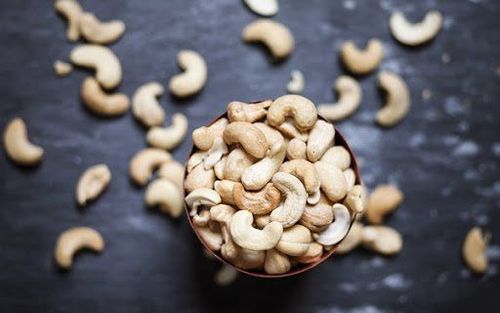
Nếu được bảo quản đúng cách, hạt điều sẽ giữ được vài tháng ở nhiệt độ phòng, một năm trong tủ lạnh hoặc 2 năm trong tủ đông
Make cereal mixes with other nuts and dried fruits. Make cashew butter (like peanut butter) by mixing and grinding whole raw cashews until smooth. Serve with main dishes like fish or chicken with a mixture of cashews and chopped herbs before grilling. Mix cashews into salads. Use cashew milk instead of milk.
3. Note when using cashews
Cashews do contain fat, but this is mostly unsaturated fat, which is healthy in moderation.Raw cashews are not safe to eat, as they contain a substance called urushiol, which is found in poison ivy. Urushiol is toxic, and exposure to it can cause skin reactions in some people.
Cashews are usually sold as raw in stores, but these are steamed. This removes the toxins. These seeds are beneficial for health.
Depending on the brand, salted and roasted cashews may contain high levels of salt and fat, which may not be healthy. It is best to check the label first and consume these nuts in small amounts.
People with a nut allergy should avoid cashews as they contain strong allergens that can lead to reactions including life-threatening anaphylaxis.
Cashews contain a lot of vitamins and nutrients, but they also contain a lot of fat. However, the fats in cashews are good fats, which can help prevent heart disease and reduce the risk of stroke. This fat also helps you feel full for longer, which can help with weight control.
Cashews provide a good source of vitamins, minerals and nutrients that are beneficial to the body. Eating nuts like cashews has been linked to cancer prevention, heart health, and weight maintenance.
In general, it is better to eat a varied diet than to focus on individual foods as the key to good health.
Please dial HOTLINE for more information or register for an appointment HERE. Download MyVinmec app to make appointments faster and to manage your bookings easily.
Articles refer to sources: healthline.com, medicalnewstoday.com




